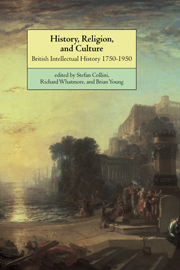Book contents
- Frontmatter
- Contents
- Preface
- General introduction
- Presentation of History, Religion, and Culture
- Part I
- 1 Historical distance and the historiography of eighteenth-century Britain
- 2 Gibbon and the primitive church
- 3 Gibbon's religious characters
- Part II
- Part III
- List of contributors
- Acknowledgements
- Index
3 - Gibbon's religious characters
Published online by Cambridge University Press: 03 December 2009
- Frontmatter
- Contents
- Preface
- General introduction
- Presentation of History, Religion, and Culture
- Part I
- 1 Historical distance and the historiography of eighteenth-century Britain
- 2 Gibbon and the primitive church
- 3 Gibbon's religious characters
- Part II
- Part III
- List of contributors
- Acknowledgements
- Index
Summary
For Gibbon's contemporaries there was no debate. They knew that Gibbon was a religious sceptic in the manner of Voltaire, and they also knew that, like his notorious predecessor in disbelief, Bolingbroke, the infection had been acquired by personal contact. The greatest English historian had left Oxford in disgrace, and had instead chosen to graduate from the infidel schools of Ferney and Battersea.
Even Gibbon's friends and defenders felt that there was little that could be done by way of rebuttal. For instance, while preparing the Miscellaneous Works for publication Sheffield drafted a long note extenuating Gibbon's irreligion:
Mr Gibbon was not, in the first instance, aware how offensive his Irony, and manner of mentioning the Christian Religion must be; and that he did not mean to outrage Society in the Degree that has been supposed … When the mischief and wantonness of disregard to established Opinions was mentioned, he exceeded in expression all that was said. He was so habituated to the infinitely more extravagant writings of Voltaire and others, and to the extreme levity of conversation, among the generality of those with whom he had lived, that he thought himself comparatively decent; and has often expressed great surprize that He had given so much Offence.
To have presented Gibbon's religious scepticism as, as it were, a failure of table manners, picked up innocently and by accident in the wrong sort of company, might have been an effective strategy of exculpation if it could have been brought off. However, in the event Sheffield left the note unpublished.
- Type
- Chapter
- Information
- History, Religion, and CultureBritish Intellectual History 1750–1950, pp. 69 - 88Publisher: Cambridge University PressPrint publication year: 2000



